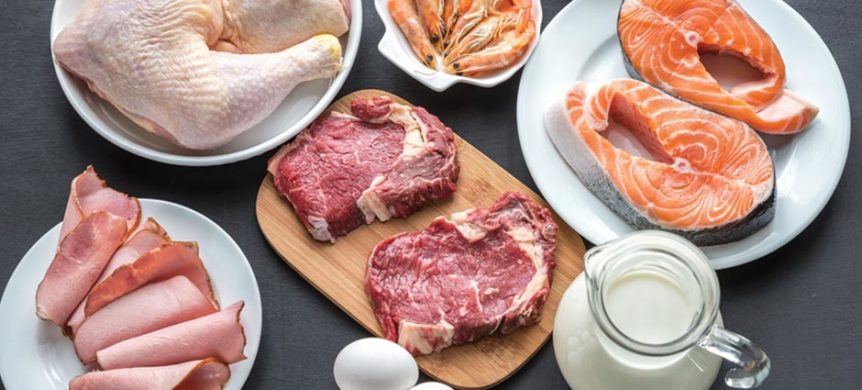Years ago, most of us gave little thought to protein. But thanks to the advent of high-protein/low-carbohydrate diets like Atkins and, more recently, the paleo movement (which advocates a diet high in unprocessed protein like wild-caught fish and grass-fed meat), this macronutrient has become a source of debate. How much protein should you eat? What are the best sources? Should you load up on protein after exercise? Can vegetarians and vegans get enough protein from plants alone?
To answer these questions, we scoured dozens of research papers, spoke with nutrition experts and consulted the latest U.S. dietary recommendations. Here’s what we found.
You Are What You Eat
One thing experts agree on: Protein is essential to the human diet. The old adage “you are what you eat” holds especially true, because our muscles, skin, hair, bones and organs are made primarily of protein. In fact, protein is the second-most abundant molecule in the body (after water). It’s one of the three macronutrients essential to providing your body with energy; fat and carbohydrates are the other two. And, it plays an essential role in healing, muscle building and growth.
How Much Protein Should You Eat?
The USDA recommends a daily allowance (RDA) of 0.36 grams of protein per pound of body weight—that’s roughly 54 grams per day for a 150-pound person (to put that in real-life terms, check out “What Does 20 Grams of Protein Look Like?”). But many experts believe that’s not enough. Recently, the International Society of Sports Nutrition looked at available research and released a position statement on protein. They say that if you’re an active adult, your body needs more than the RDA of protein to build lean tissue and repair exercise-induced muscle damage. Other research out of Harvard Medical School suggests that replacing some of the starch, sugars and processed fats in your diet with protein is good for your heart and your waistline. But the question remains: How much more protein do we need?
There’s no simple answer to that question, says Jonathan Bailor, New York Times best-selling author of The Calorie Myth (Harper Wave, 2013) and founder of sanesolution.com. Your dietary protein needs vary with your body size and activity level, he says.
A good rule of thumb, based on recommendations from several recent studies, is this: If you’re sedentary, then the RDA of 0.36 grams of protein per pound of body weight should suffice. But if you’re active—say you exercise a few times per week—bump that up to 0.5 grams per pound of body weight, about 75 grams per day for a 150-pound person. And if you’re highly active—looking to build muscle, endurance and strength—you can consume even more: 0.6 to 0.9 grams per pound of body weight per day, or 90 to 135 grams for a 150-pound person.
When Is the Best Time of Day to Eat Protein?
For years we’ve been told that the best time to consume protein is at dinnertime, and/or within an hour of exercising to promote muscle recovery. As a result, protein shakes are very popular, especially among fitness and weight-loss enthusiasts. But new research says that it’s better to consume protein throughout the day, at every meal. Researchers at Lehman College in New York City and California State University, Northridge, found that total protein intake throughout the day (plus regular exercise) is more crucial to muscle gains than protein loading at certain times of day.
Protein Staves Off Binges and Cravings
One benefit of eating protein throughout the day is that it diminishes junk food cravings. Protein takes longer to digest, Bailor says, and leaves you feeling fuller much longer than other foods, like carbs and processed grains. For that reason, it’s not a bad idea to drink a protein shake after you exercise. For one, the protein restores your energy and helps you feel full, so you’ll be less likely to “reward” yourself with unhealthy food post-workout. A dose of protein will kick-start recovery and muscle building, too.
How Can Vegetarians and Vegans Get Enough Protein?
The Academy of Nutrition and Dietetics says well-planned vegetarian diets deliver all the vitamins and nutrients the human body needs, including protein, and that vegetarian diets are associated with several health benefits, including lower blood cholesterol levels, lower risk of heart disease, lower body mass and decreased risk of diabetes. “Plant protein can meet protein requirements when a variety of plant foods is consumed,” the Academy writes.
Variety is key. If you’re vegetarian or vegan, you will have to be more vigilant, making sure you’re getting enough protein from numerous sources. Combining legumes, whole grains and greens, for instance, will ensure that you get not just protein, but the full range of amino acids your body needs.
Not All Protein Sources are Created Equal
Some protein sources are more concentrated than others. For example, eggs are about 34 percent protein. Beans are about 20 percent protein, and nuts are less than 20 percent protein. “Compare that to wild-caught seafood and humanely raised animals, which can be upward of 90 percent protein, and you’ll see why animal sources are most efficient,” says Bailor. “Animal sources of protein also provide dramatically better amino acid profiles (they are ‘complete’ proteins).”
A complete protein is one that contains all nine essential amino acids, which are ones that our bodies can’t create on their own and must be consumed. And while all animal proteins are complete, a few plant proteins, including those in quinoa, soy, buckwheat and hemp, are complete, as well.
Whatever diet you follow, be it omnivore, vegetarian, vegan, paleo or something else, make a conscious effort to work protein in throughout the day, every day. Your body will thank you.

